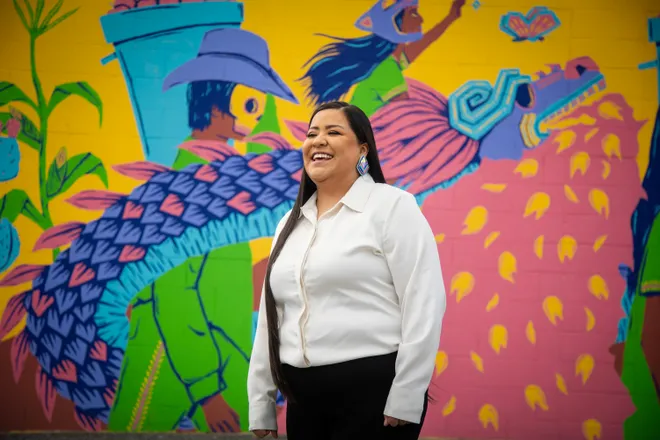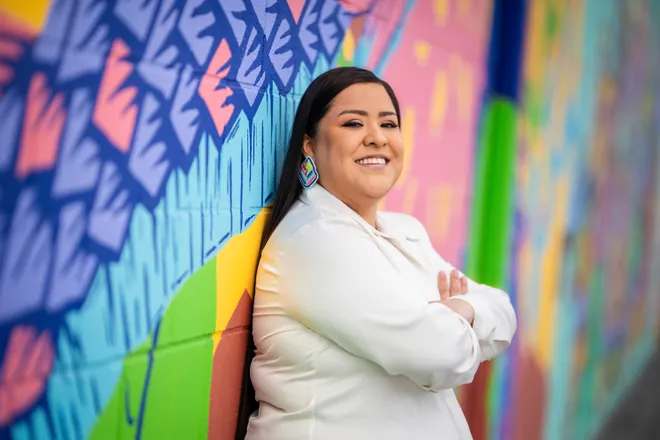Storytelling as a tool for change: How Marielena Vega found her voice through farmworker advocacy
Marielena Vega was a shy kid, often hiding behind her mother’s skirt, too afraid to speak. But behind her reserved temper was a young girl listening deeply, analyzing her surroundings and getting a feel for the spaces she found herself in. Vega's inquisitive nature lends itself to her powerful storytelling.
Last March, Vega traveled across the country to Washington, DC where she spoke in front of hundreds of attendees at the farmworkers for climate action rally. It was a defining moment for Vega as she shared her story working in extreme climates from the field. “Farmworkers provide very essential work here in the U.S...we don’t want to be overlooked or silent anymore.” Vega declared to the crowd.

The oldest of five siblings and daughter to immigrant parents, Vega said she couldn’t have imagined sharing some of her most vulnerable experiences in front of hundreds of strangers. But the first-gen Latina Idahoan proves to be a dynamic leader with a profound care for her community.
Vega grew up in a family of farmworkers and is intimately acquainted with the harsh working conditions and financial limitations of living off a farmworker salary. After graduating from the University of Idaho, she began volunteering her time with the Idaho Organization of Resource Councils, where she is now a board member.
Vega is a community organizer, helping raise money and distribute supplies to farmworkers across the state. By sharing stories from her community, she hopes to spread awareness of the harmful working conditions farmworkers are often exposed to. Vega and her fellow organizers are continuing to advocate for legal protection of farm laborers across the country.
“We've seen the power that storytelling has” Vega said.
For her deep commitment to advocating for the rights of farmworkers both in her community and nationally, Vega has been named USA TODAY's Women of the Year honoree from Idaho.
This conversation has been edited for length and clarity.
Who paved the way for you?
My mom, she's a survivor of a lot of things but also she’s a nonconformist. Being raised in a small town in Mexico, she went against the grain and decided to get an education and become a teacher. Back then, It wasn't normalized for a young woman to focus on education before more traditional expectations, like getting married and becoming a housewife.
She continued to hold her ground despite the different challenges and judgments she received. She persevered and survived a difficult and challenging environment.

What is your proudest moment?
Speaking at the farmworkers for climate change rally in Washington, DC was a huge moment for me. Washington, DC feels like a significant place for anyone growing up in the United States. But it wasn't just about being in the nation's capital that felt significant, it was also my public speaking. As a kid, I was shy and afraid to speak. Being able to go in front of strangers and share something as vulnerable as my story was amazing. Sharing a part of my identity as a Latina Idahoan from a mixed status family whose parents were undocumented at one time, who also was a farm worker herself— It was such a powerful moment. As a young girl, I could have never imagined I'd be speaking out at a rally in Washington, DC of all places.
What is your definition of courage?
Although my definition of courage has changed throughout the years, I view it as an attitude. Courage is not being afraid to be myself. English is not my first language. I own my Spanish. If I forget how to say a certain word in English, instead of stumbling over my words, I say, 'you know what I can't remember the word I'm looking for but this is what I'm meaning.'
I'm not the kind of person who is going to talk at the beginning, I'm a listener first, I'm collecting my thoughts. When it comes time to get fierce and to speak up, I do. I own this about myself. Courage is about being comfortable in my own skin.
Is there a guiding principle or mantra you tell yourself?
Focusing on what's in front of me now instead of worrying so much about the future. I used to tell myself I want to accomplish all these things by 30. But I'm content right now, I'm focusing on the present moment. I'm trying to be intentional of using the space and time that I'm working with right now.
Who do you look up to?
My mom is my biggest inspiration, she's my rock. She taught me that sometimes you'll face uncertainties in life and and it's not going to be the best feeling, but you have to go towards these unknowns and work through it.
My younger sisters are also a big inspiration to me. They each have their own personalities and own interests. I admire them for being different, for expressing themselves uniquely and for following their individual passions.
How do you overcome adversity?
What helps me overcome adversity is knowing that I have a community that supports me. It doesn't matter how close we are or how often we're in contact, if I need someone to ask for advice or support, I know there will be people in my community to assist me. Community could be my folks at home, my close friends, or people in the organizing space who share the same successes and hardships as me. Community could also be farmworkers who share the same frustrations of navigating spaces that wish to exclude us.
What advice would you give your younger self?
The places where you come from—no matter how small or how rural your home may seem— do not dictate your importance in this world. Your experiences and your voice are important and needed. You deserve to be heard.
Disclaimer: The copyright of this article belongs to the original author. Reposting this article is solely for the purpose of information dissemination and does not constitute any investment advice. If there is any infringement, please contact us immediately. We will make corrections or deletions as necessary. Thank you.


